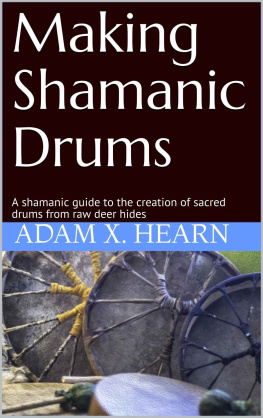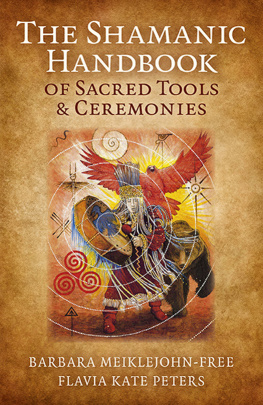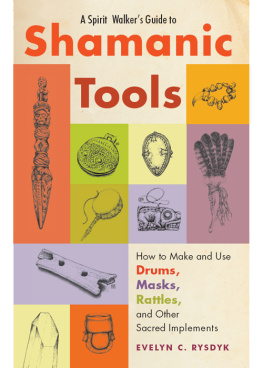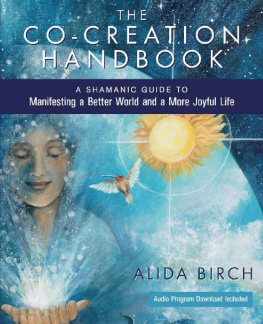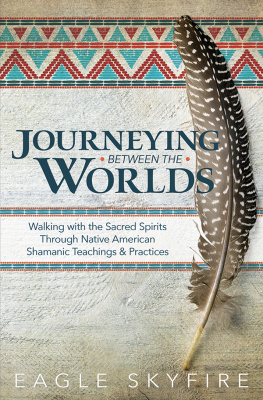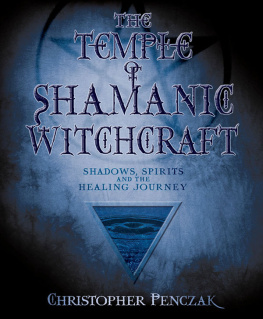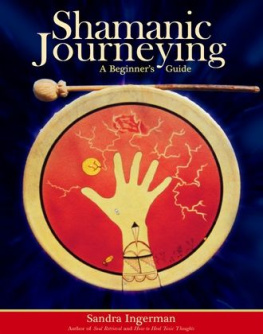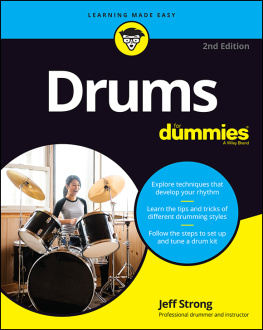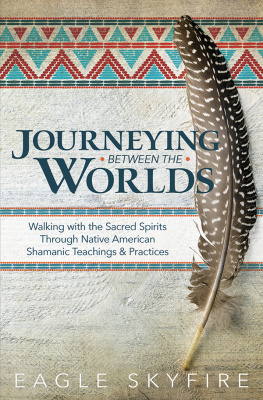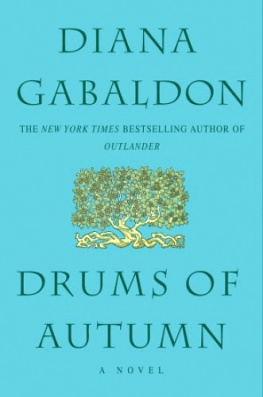Adam X. Hearn - Making Shamanic Drums: A shamanic guide to the creation of sacred drums from raw deer hides
Here you can read online Adam X. Hearn - Making Shamanic Drums: A shamanic guide to the creation of sacred drums from raw deer hides full text of the book (entire story) in english for free. Download pdf and epub, get meaning, cover and reviews about this ebook. year: 2019, genre: Religion. Description of the work, (preface) as well as reviews are available. Best literature library LitArk.com created for fans of good reading and offers a wide selection of genres:
Romance novel
Science fiction
Adventure
Detective
Science
History
Home and family
Prose
Art
Politics
Computer
Non-fiction
Religion
Business
Children
Humor
Choose a favorite category and find really read worthwhile books. Enjoy immersion in the world of imagination, feel the emotions of the characters or learn something new for yourself, make an fascinating discovery.
- Book:Making Shamanic Drums: A shamanic guide to the creation of sacred drums from raw deer hides
- Author:
- Genre:
- Year:2019
- Rating:5 / 5
- Favourites:Add to favourites
- Your mark:
- 100
- 1
- 2
- 3
- 4
- 5
Making Shamanic Drums: A shamanic guide to the creation of sacred drums from raw deer hides: summary, description and annotation
We offer to read an annotation, description, summary or preface (depends on what the author of the book "Making Shamanic Drums: A shamanic guide to the creation of sacred drums from raw deer hides" wrote himself). If you haven't found the necessary information about the book — write in the comments, we will try to find it.
Adam X. Hearn: author's other books
Who wrote Making Shamanic Drums: A shamanic guide to the creation of sacred drums from raw deer hides? Find out the surname, the name of the author of the book and a list of all author's works by series.
Making Shamanic Drums: A shamanic guide to the creation of sacred drums from raw deer hides — read online for free the complete book (whole text) full work
Below is the text of the book, divided by pages. System saving the place of the last page read, allows you to conveniently read the book "Making Shamanic Drums: A shamanic guide to the creation of sacred drums from raw deer hides" online for free, without having to search again every time where you left off. Put a bookmark, and you can go to the page where you finished reading at any time.
Font size:
Interval:
Bookmark:


Adam X. Hearn
MAKING SHAMANIC DRUMS
A guide to the creation of sacred drums from start to finish

PLEASE NOTE:
This book contains pictures of deerskins being processed which may be upsetting to sensitive readers. I have tried to convey the important points about the process whilst keeping these images to a minimum but this manual would not be complete without them. Reader discretion is advised.

Making Shamanic Dr um s
ADAM X. HEARN
Acknowledgements
With deep gratitude to Irene Zumsteg, Natascha Kenyon, Gordon Rimes and Peter Hearn as well as all those other people who have assisted me and joined me on drum birthing workshops over the years. I honour each and every one of you, and the deep connection with Spirit that you bring.
This book would not be possible without the Spirits; of the deer, of the trees, of the drums, of the Upper, the Lower, and the Middle World, of the Ancestors, of those that were, those that are and those that will be. I salute you!
Copyright Adam X. Hearn 2019, All rights reserved.
PROLOGUE
WHAT IS SHAMANISM?
WHAT IS SHAMANIC JOURNEYING? 23
*EEG RESPONSES TO SHAMANIC DRUMMING. DOES THE SUGGESTION OF TRANCE STATE MODERATE THE STRENGTH OF FREQUENCY COM- PONENTS_ MATEUSZ KONOPACKI, GUY MADISON JOURNAL OF SLEEP AND SLEEP DISORDER RESEACH VOL.1 ISSUE 2018
DIFFERENT USES OF A SHAMANIC DRUM
SOURCING DEERSKINS
VEGAN DRUMS
THE PROCESS OF PREPARING A GREEN SKIN: SCRAPING 48
TOOLS
SOAKING
STRETCHING THE DEERHIDE
THE HOOP: MAKE OR BUY A HOOP?
THE HOOP: ENGRAVING/ETCHING, ANOINTING
DYING THE HIDE
MAKING MULTIPLE DRUMS FROM ONE HIDE LOCATION 97
THE DRUM BIRTHING ITSELF
CORD- GETTING IT RIGHT LACING THE HIDE
THE FINAL BINDING, CREATING THE HANDLE
PAINTING THE DRUM
DESTROYING DRUMS
BLOOD DRUMS 145
DRUM BIRTHING AS A HEALING POWWOW DRUMS 151
THE BEATER
AFTERCARE FOR YOUR DRUM
RATTLE-MAKING WITH YOUR OFF-CUTS
BEWARE THE PLASTIC SHAMAN!
RECOMMENDED READING/ BIBLIOGRAPHY BIOGRAPHY 180
Using a single headed frame drum to beat a repeated rhythm in an attempt to connect to the spirit world is something which has been done for many hundreds if not thousands of years in many cultures all around the world. In fact, recent archaeological discoveries in Greenland identified the remains of two drums of the Saqqaq people, which date back 4500 years. These were almost identical in height, thickness and cross-section to those collected by a Danish Polar explorer by the name of Knud Rasmussen who collected drums from the Inuit in the 1920s.
Going further back in history, just outside the village of Mezhyrich in the Ukraine, a farmer dug up the remains of a mammoth skull drum, painted with patterns in red ochre, and dating back some 15000 years. Naturally this is not a frame drum, but because of the inferred shamanic connection it felt important to include this. There are also reports that I have been unable to substantiate of an even older elephant skin drum, which is believed to be 37000 years old. Either way, what we do know is that some of the earliest instruments used by humanity are identifiable as drums. There is also a known depiction of a drum painted in a shrine room in what is now modern day Turkey, which dates back to 5600 BCE. It is believed that this was a matriarchal society and that the drum was sacred to the Goddess.
However, though these may very well be the oldest physical evidence that we have of drums which were of a shamanic nature, this is far from the same as saying that frame drums are no older than this! The main reason for this is that even if drums are not easily identifiable in older rock art, this does not mean that they are not simply misidentified or overlooked, as there are often cir- cular depictions which could be interpreted as drums. In addition, drums in many shamanic cultures are perceived as embodying spirits which take on animal forms, and would hence be painted or carved in animal form.
In the past 2000 years, there is evidence that Shamanic drums have been used (and are often still in use) within indigenous com- munities globally, in Asia, Europe, Africa and the Americas. Amongst the undefeated and unconquered Mapuche people of modern day Chile and Argentina, the Kultrun drum has been in use since before written records and is still very much in use today. This is a single headed drum, which is normally made from the Foy (Canelo) tree, and the skin is secured in place over a wooden bowl. Some of the main reasons that this specific wood is used are its medicinal and symbolic qualities such as its hermaphroditic flowers (mirroring the often hermaphroditic energy of Mapuche Machi healers) .

This type of bowl drum remains the drum of choice amongst Mapuche communities today for shamanic drumming, possibly due to the circumference being smaller, making them more portable, as well as issues with producing strong hoops using no glue ( A bowl is the logical next shape which can be carved directly from a burl in the tree, or from the trunk itself). This bowl style of shamanic drum was also common amongst the Sami people of Northern Europe, who still use this style of drum, albeit less frequently now that drum hoops are easier to procure.
In Europe and central Asia, historically, images of priestesses drumming can be identified in the art and writings of many pre- Christian cultures such as the Sumerians, Minoans, Greeks and Romans. So much so, that there is some debate on whether the drum as a sacred instrument was exclusively in the hands of our
female ancestors. Indeed, the connection between the beat of a drum and the heartbeat within us all is so strong that the Romans identified the drum as being the sacred instrument of Cybele, mother Goddess, a statue of whom stands in the very centre of the city I grew up in, and perhaps connected to my own journey with the drum. Cybele, identified as the mother Goddess, was also connected with wild music, wine, and ecstatic trance. Although the worship of ancient Greek and Roman deities has almost totally disappeared, many drum remains have been discovered by archaeologists show- ing that these were of importance throughout the classical time period. It does not take a huge leap of faith to see these reflected in modern day folk use of drums, such as the Bodhran in Ireland.
The single headed frame drum is often associated with Native American cultures, probably due to the effect of Hollywood and the countless spaghetti westerns that were churned out in the 1950s and 1960s. It must be made really clear that although drums were and are an integral part of many tribal traditions in the North Americas, drums of this type were by no means restricted to this part of the world. It is shocking to think about how our perceptions are shaped by the media! In fact, the Eastern European tradition of shamanism was always very powerful, so much so that under the Soviet Union shamanism was banned as a potential threat to the state, and many practitioners were either sent to the gulags or killed outright. Additionally, shamanic artefacts were forbidden and many drums were collected and destroyed. It is against this background that we encounter the use of ribbons instead of a beater to play a drum, for this was much quieter and less likely to result in discovery and arrest. In a different world, perhaps the names
Font size:
Interval:
Bookmark:
Similar books «Making Shamanic Drums: A shamanic guide to the creation of sacred drums from raw deer hides»
Look at similar books to Making Shamanic Drums: A shamanic guide to the creation of sacred drums from raw deer hides. We have selected literature similar in name and meaning in the hope of providing readers with more options to find new, interesting, not yet read works.
Discussion, reviews of the book Making Shamanic Drums: A shamanic guide to the creation of sacred drums from raw deer hides and just readers' own opinions. Leave your comments, write what you think about the work, its meaning or the main characters. Specify what exactly you liked and what you didn't like, and why you think so.

